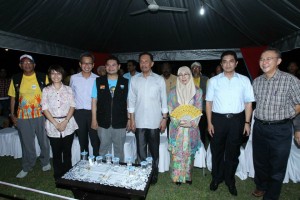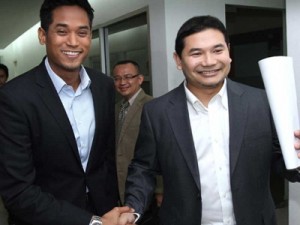Engineer by training, accountant by choice, a reluctant politician and now under investigation for exposing the NFC scandal – Rafizi Ramli wears many hats. The PKR Strategic Director speaks to Chung Hosanna about his chances in Pandan, why he wants to see Tun Mahathir “in prison”, and the perils of being a whistleblower.
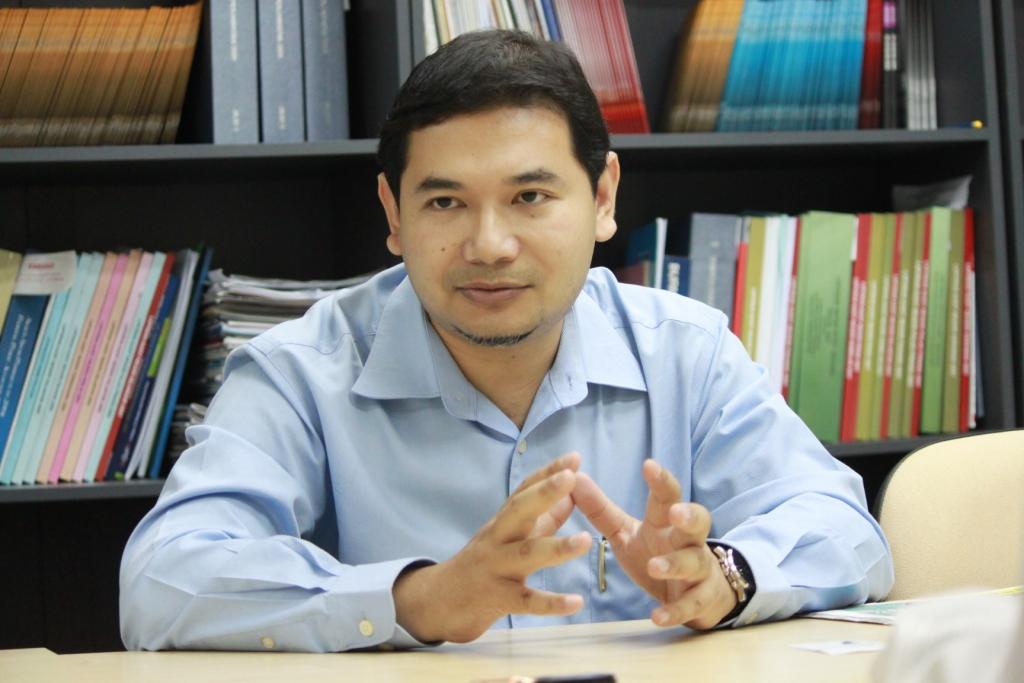 At 35, Rafizi Ramli is at the prime of his life, newly married and slotted to make his electoral debut in the Pandan constituency in the next General Election. The former accountant has been making waves in the news since his sensational expose of the National Feedlot Corporation (NFCorp) scandal.
At 35, Rafizi Ramli is at the prime of his life, newly married and slotted to make his electoral debut in the Pandan constituency in the next General Election. The former accountant has been making waves in the news since his sensational expose of the National Feedlot Corporation (NFCorp) scandal.
Rafizi’s documented accusations that NFCorp misappropriated RM250 million of public funds earned him the nickname “cowboy”.
He explains that many Pandan residents might not know what is NFC, but they recognise him from newspaper photographs that often depict him together with Shahrizat and cows.
Eventually, Minister Datuk Seri Shahrizat Jalil resigned over the cow-gate allegations against her husband and children, directors of the NFCorp.
Taking the Bull by its Horns
In August, Rafizi was charged under Section 97 of the Banking and Financial Institutions Act for revealing confidential banking documents pertaining to the NFCorp scandal. The charge carries a maximum jail sentence of three years or fine up to RM3 million.
Charged for not revealing the information to the “proper channel”, Rafizi says in his defence that the laws in Malaysia are unfairly stacked against the whistleblowers, and designed to protect the perpetrators or those in power.
“The onus on the whistleblower is too big, and the risk is too high. The moment you give your evidence to the MACC, or the police, you’re not allowed to say a single word to anyone. Lest you’re charged under the MACC Act.”
Instead, Rafizi chose to reveal all to the media, being aware of the risks. He decided to defy a law that he calls “cruel” and getting in way of public interest. He likens it to the 40-year battle against the just-repealed Internal Security Act (ISA).
“The choice for public officials and those in political office is this: do we fear and obey the unjust law, or do we do what is right – as we have done with the ISA.” Rafizi says he has no regrets choosing the latter.
It has garnered him a lot of publicity, which will come in handy should he be fielded as planned in Pandan in the next election.
Perilous in Pandan
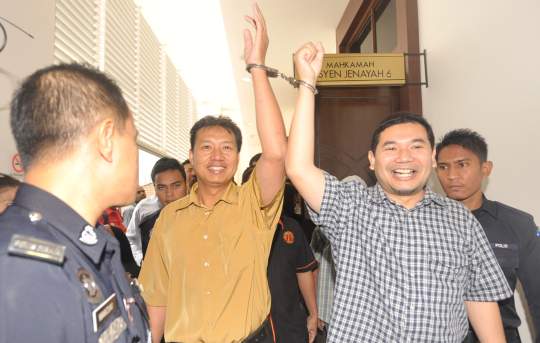
Arrested together with former Public Bank clerk Johari, for revealing information related to the NFCorp scandal
Despite his increased national profile, the fight for Pandan will not be a walk in the park. Pandan is currently held by six-term MP, Ong Tee Keat, a familiar face to the locals for the past 22 years. Despite his rocky exit from the MCA Presidency he briefly held, Ong is still a formidable opponent and remains popular especially among the older voters.
Pandan is a mixed constituency with 55% non-Malay voters, it was the only mixed constituency in the so-called “PKR belt of the country” which PR lost in the 2008 election. The other nearby seats – Selayang, Gombak, Wangsa Maju, Ampang, and Bandar Tun Razak- were all won by PR.
Rafizi pointed out that in 2008, Pandan’s Malay voters bucked the national trend by voting PKR, whereas most Chinese votes went to Ong. Although split racial voting cost PR the seat, Rafizi believes that the situation has changed, post 2008.
“In 2008, there was no Pakatan Rakyat. The three parties campaigned separately. DAP’s campaign was very different and separate from PKR, so PKR didn’t really ride on Jenice Lee’s campaign in Teratai.”
This time around, PR has been working together closely in the constituency for maximum impact, with Rafizi often showing up at DAP functions together with Teratai state assemblyperson Jenice Lee.
The response from Chinese voters has been encouraging, with high positive response to the SMS blast and an increased Chinese turnout at ceramahs. All it takes for PR to win Pandan is a shift of about 1,500 Chinese voters, a number Rafizi believes is achievable.
If the tsunami hits Pandan, perhaps it may drown Ong Tee Keat after all. Although regarded as the underdog, Rafizi is unafraid to face the veteran politician.
“Ong Tee Keat is a much-tamed lion now, he’s a puppy. He has to decide whether he is on the side of reform, or is he still harbouring the ambition to be MCA President.”
While he acknowledges Ong is a strong candidate with a good service record, Rafizi believes that this election will not be about personalities, but about change. The mood for change in government is in the air, and whoever takes Pandan, it will be a close contest with a small winning margin.
“Send Tun M to Prison”
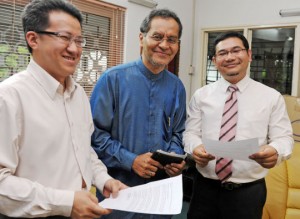
With Liew Chin Tong and Dr Dzul of the PR Secretariat at the Alternative Budget announcement last year
Asked what he hopes to see in the next General Election, Rafizi quips, “I would like to see Tun Dr Mahathir in prison. OK-lah, maybe not in prison, but I would like to see him made accountable for his 23-year rule, either by a Royal Commission of Inquiry. So long as he is made to answer for what he has done.”
While the preceding two prime ministers after Mahathir have been a lot weaker, there is a sense of post-retirement nostalgia which depicts him as benevolent and magnanimous as compared to Pak Lah and Najib, Rafizi says.
“Most of the younger generation cannot remember Memali, they cant remember 1988 (constitutional crisis), most of them cannot even remember Reformasi, for that matter. They just remember him as an old statesman.”
Rafizi says that although Mahathir may cast the blame on Pak Lah and Najib, a lot of the nation’s problems are a direct product of Mahathir’s 23 years in power.
The former Petronas scholar witnessed first-hand the iron fist regime that quelled the 1998 uprising when Deputy Premier Anwar Ibrahim was unceremoniously sacked. Rafizi, who was then studying in the UK, was actively involved in the Free Anwar Campaign.
“We are all children of our times. Ours was a traumatised generation. Thousands took to the street for a cause that they believe is for the good of the country, but they were greeted with water cannons and brutalised.”
“When that happens, it’s not just about Anwar Ibrahim, it becomes personal.”
In the same way, Rafizi believes that Bersih is a cause that is very personal to this generation of first time voters. In scenes reminiscent of the reformasi era, 300,000 people turned out during the Bersih 3.0 rally for electoral reforms earlier this year.
“The more you lie to them, the more you brutalise them, it will strengthen their resolve. This will sustain the reform movement until we achieve the goal of getting rid of BN.”
This was the goal foremost in his mind when he left a high-flying corporate career in Petronas to work as chief executive of the Selangor state economic advisory office in 2009. Since leaving the post three months ago, Rafizi has been concentrating on party work and his role in the Pakatan Rakyat secretariat, which is the core policy-making body of the coalition.
Pakatan’s Prudent Fiscal Management
The PR Secretariat were responsible for drafting PR’s Common Policy Framework, Shadow Budget, Orange Book, and are currently completing the draft elections joint manifesto.
The Secretariat comprises four representatives from DAP, PKR, and PAS respectively. The line-up varies during each meeting but mainstays include DAP Publicity Secretary Tony Pua, DAP International Secretary Liew Chin Tong, and Dr Dzulkefly Ahmad of PAS.
Currently, the PR secretariat is focusing on solutions for the people’s daily economic woes, as well as macroeconomic solutions to address national fiscal issues.
PR has made some bold proposals along the way, including abolishing tolls, reducing petrol prices, and lately, slashing car excise duties. Rafizi outlines four areas that PR intends to reform totally, which are: water, electricity, telecommunications and tolls. At the moment, PR is primarily focusing on reforming these four public utilities that impact daily expenditure.
By extension, PR also has deep discourse about solving the country’s fiscal problems caused by mismanagement of national finances. A double-pronged approach is needed to increase revenue while scrutinising areas to cut expenditure and plug leakages.
Before 2008, people would accuse the opposition of only being able to parrot, attack, and criticise. There was a mental block that any opposition party would not be able to govern. Today, the tune has changed.
Rafizi says PR’s track record in the past four years has proven its undisputable prudence with money. Penang has decreased its state debt by a phenomenal 95%, while Selangor has pushed up its state reserves to RM2.2 billion. The stellar performances are getting BN jittery and defensive.
“At first they (BN) criticised us. Then they said it was impossible to do…would bankrupt the country. After they sat down and made the calculations, they started scratching their heads and trying to implement what we had promised.”
Feasible Plans, Tangible Results
The Auditor General’s report estimates that RM28 billion has been leaked, while Transparency International puts the wastage figure higher at RM40 billion.
Whereas the combined total of PR’s proposed programs in Buku Jingga cost RM21 billion, leaving comfortable room to cover the cost.
“If we want to answer sceptics bluntly, let me put it this way: if we can afford all the mega projects for the past 30 years which have cost the country trillions of ringgit, surely we can afford RM21 billion for the Buku Jingga package?”
“We can realise extra revenue either by cutting wastages or pumping the money back to the public for economic growth. All the accusations that our programs are not feasible or sustainable, I think that excuse is getting really trite and the public is tired of it,” Rafizi says.
Rafizi believes that PR has better policies to offer the people and the nation. This comes as somewhat of a rude shock to BN, which has never been put to the task of competing in policies.
BN has relied on character assassination, persecution and intimidation to remain in power. After 55 years, this is the first time they have to face an organized opposition with a policy platform that can rival what they have been offering.
“I don’t think BN leadership has the acumen to argue on policies. They have been relying on government officials, consultants and officials to feed them answers to can read in Parliament.
That’s why they fear debate. If you put them in a public debate, they will say the worst kind of things. But I think it will backfire. The public is a lot more educated nowadays,” he says. –The Rocket

